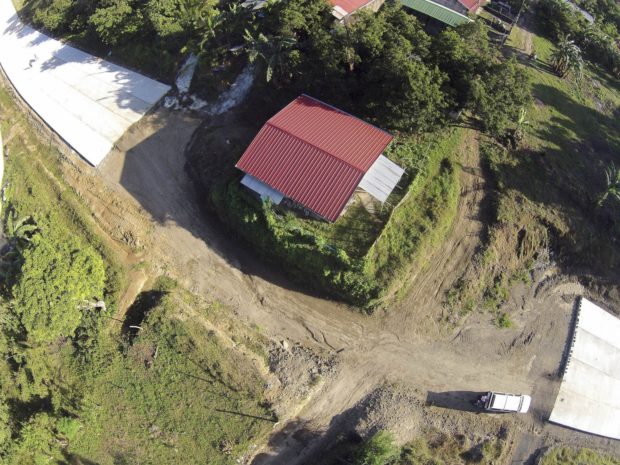
MIDDLE GROUND Sen. Panfilo Lacson says the owners of this house and public works officials have “found a middle ground,” allowing the diversion project in San Pascual town, Batangas province, to proceed. The owners will be paid as early as Friday, he says. —GRIG C. MONTEGRANDE
The owners of a house that stands in the middle of a diversion road under construction in San Pascual town, Batangas province, have accepted an offer of payment from the Department of Public Works and Highways (DPWH), in a positive sign for government infrastructure projects plagued by right of way issues.
On Monday, the day the Inquirer began publishing a special report on pork in the budget, including right of way complications, DPWH officials told the Senate that the problem had been resolved in at least one case — the family residing in the red-roofed bungalow obstructing the partially constructed highway in San Pascual.
“Regarding the featured picture in the Inquirer today (Monday), here’s the answer of the DPWH … I am told, Mr. President, that the offer has been accepted” by the owners, said Sen. Loren Legarda, who was defending the DPWH budget during plenary debates on the P3.8-trillion spending program for 2019.
No specific details were given during Legarda’s exchange with Sen. Panfilo Lacson, who grilled Legarda about right of way issues that led to zero or close-to-zero physical accomplishments for P74.6 billion worth of road and bridge projects in 2018.
Middle ground
Reached on Tuesday, Lacson confirmed the DPWH settlement with the Brucal family, whose house was photographed by the Inquirer and featured on its front page on Monday to illustrate the severity of the right of way problem.
“Yes, they found a middle ground even as they started on a highly emotional note,” Lacson said.
Asked how much the DPWH offered the family, Lacson said: “They will do the computations, but they agreed to make the payments as early as this Friday.”
The Brucal family earlier told the Inquirer that the DPWH had offered P710,393.34 for the house but nothing for the 100-square-meter lot, since they had only tax declarations to prove ownership of the property.
The family did not accept that first offer.
As for the other claimants affected by the Batangas project, Lacson said there were encouraging signs of a settlement after some of the families met with DPWH representatives in his office after Monday’s session.
‘Find a solution’
“I advised the director of the DPWH Region IV-A to [just] find a solution instead of arguing and looking for problems,” he said.
Although at least one case had been resolved, Lacson said his advocacy was not finished.
“There’s P250 million [right of way] appropriations for the Batangas project and there should be no reason to make those poor souls wait” to be paid, he said.
“I will continue to urge the DPWH leadership to render justice, especially to the poor claimants who don’t have the wherewithal to have their claims processed and finalized,” he added.
During Monday’s session, Legarda spoke on the DPWH’s behalf and conceded Lacson’s point that access problems should be settled and landowners paid at the soonest possible time.
“You’re right, these people have rights. [The] DPWH is aware of it. They say they have funds. They say everything is [going on], and indeed people have to be paid for it,” she said.
Never-ending story
Lacson replied: “The problem, Mr. President, is year in and year out, we have the same conversation, the same questions, the same answers, the same commitments and yet, next year, we will be talking about this again.”
During his interpellation, Senate President Pro Tempore Ralph Recto identified some of the problems faced by landowners.
For one, he said, many longtime Batangas residents do not have titles, even though the government may only pay for right of way on titled lands or those with at least 30 years of tax declarations.
Another complication is valuation since, under existing policy, only government financial institutions like Land Bank of the Philippines and Development Bank of the Philippines can appraise the value of land for right of way payment, Recto said.
He said a solution to such concerns must be found or it would take years to complete the affected infrastructure projects.
Under Republic Act No. 10752, or the Right-of-Way Act, the government may take private real property for national government infrastructure projects after paying the owners the appraised value.
Prompt compensation
Section 2 of the law states that the government must ensure owners “are promptly paid just compensation for the expeditious acquisition of the required right of way for the projects.”
Lacson had cited examples of infrastructure projects with right of way problems, including the Batangas City-San Pascual-Bauan access road with an estimated budget of P1.104 billion.
The 10.8-kilometer, four-lane access road is expected to benefit the tourism and industrial sectors in San Pascual, Bauan and Mabini towns.
Another project with right of way problems is the Lipa City-Padre Garcia Diversion Road, which is part of an estimated P2.115-billion project, including a 12-km road to ease traffic on the route from Manila to San Juan, Batangas.
According to the DPWH, there are still 140 unsettled right of way obligations along the Batangas City-Bauan diversion road.
In addition, more than 100 landowners whose properties are located along the Lipa City-Padre Garcia road have not been paid.